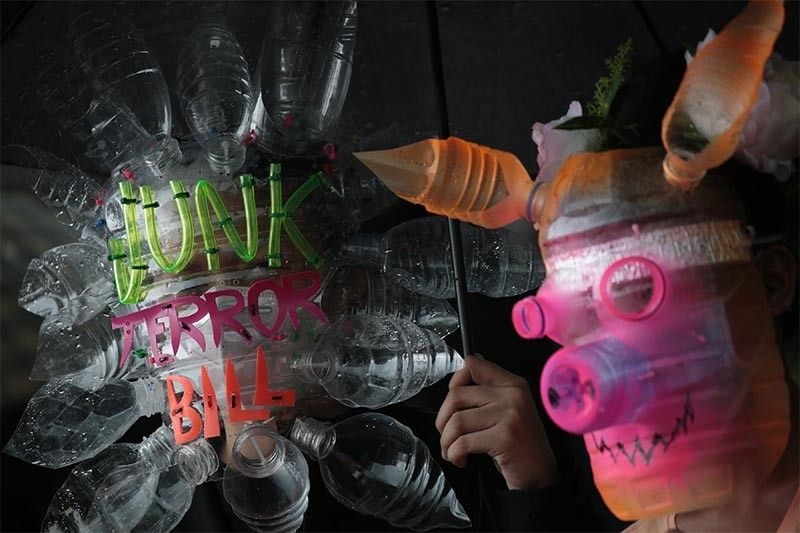Duterte's chief legal counsel urges signing of anti-terror bill amid strong opposition

MANILA, Philippines — Chief presidential legal counsel Salvador Panelo said his office recommended the signing of the anti-terrorism bill into law amid strong opposition from lawyers groups and the academe.
“Our office has studied each and every provision, which should not be read in isolation but in connection with each other so as to render the document in its entirety as well as its directives, effective in combating terrorism, and found the same passing the constitutional test,” Panelo said in a statement Friday.
The proposed Anti-Terrorism Act of 2020 reached President Rodrigo Duterte’s desk on June 9, starting the countdown to its probable enactment. The president has three options: Sign the bill which he marked as urgent into law, veto it, or let it sit for 30 days and it will lapse into law.
Safety provisions?
Panelo pointed out that the bill was crafted solely against terrorists. Our laws and Constitution will prevent abuses, and protective writs from courts may also be availed, he added.
“Fears which were raised by certain sectors are more imagined than real,” Panelo said.
Rights lawyers have been repeatedly ringing the alarm on the constitutional infirmities of the bill, saying that some provisions are open for abuse. Even the national association of lawyers, the Integrated Bar of the Philippines, have joined the call for Duterte’s veto on the proposed legislation.
Lawyers have pointed out that the new anti-terror law would allow expanded surveillance and detention for up to 24 days without charges, and lacked the safety provision against false accusations.
While it essentially puts that “advocacy, protest, dissent, stoppage of work, industrial or mass action and other similar exercises of civil and political rights” is not terrorism, it states that this only applies if those activities “are not intended to cause death or serious physical harm to a person, to endanger a person’s life, or to create a serious risk to public safety.”
The new bill also does not contain a safety provision against false accusation. Under the Human Security Act of 2007, which it is seeks to appeal, the acquittal or dismissal of charges against an accused entitles him to P500,000 a day for the period when his assets were seized, but this is not part of the proposed measure.
Strengthening policies against terrorism?
Panelo also said: “By strengthening policies against terrorism and its actors, our country will effectively be complying with our obligations to the community of natons by countering and eliminating terroristic acts through proper legislation.”
“There is an urgent need to strengthen our law on anti-terrorism in order to adequately and effectively contain the menace of terroristic acts for the preservation of national security and promotion of general welfare,” he added.
Sen. Francis “Kiko” Pangilinan earlier said that the government must shift its focus in its fight against terrorism, which is said is bred by poverty, lack of opportunity.
The National Security Plan 2017-2022 acknowledges that ensuring public safety, maintaining law and order and dispensing social justice are among "the most fundamental duties of the state" and would contribute to national security.”
READ: Actually, the government acknowledges poverty and injustice fuel conflict
International lawyers write to Philippine leaders to oppose anti-terror bill
A group of international lawyers have asked Guevarra to reject the bill and Duterte to veto it.
At least 27 lawyers’ groups across the world sent an open letter to Philippine leaders warning that the anti-terrorism bill “will suppress and criminalize free speech and dissent, label and punish political enemies as terrorists, and unjustly deprive them of basic internationally recognized human rights and due process.”
READ: DOJ vows 'thorough review' of constitutionality of anti-terrorism bill
The international lawyers likewise noted that the bill “greatly expands” the power of the Anti-Terrorism Council, who are composed of officials of the executive branch, mostly former generals.
Military and defense officials of this administration have long and repeatedly accused activist groups, as well as human rights organizations, rights lawyers and even journalists, of being "communist terrorists" or their sympathizers.
“The so-called safeguards included in the bill that claim to protect the people’s freedoms are weakened by the vague definitions of terrorism and protecting public safety and can actually serve to crush ‘legitimate’ forms of protest, such as striking workers’ picket lines and peaceful mass demonstrations,” the international lawyers also said. — with report from The STAR/Christina Mendez
- Latest
- Trending



































